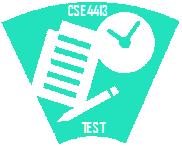Table of Contents
Lab Tests
Lab Test #1
Policies
- The test is 80-min long and will be held in Prism.
- Bring a photo ID.
- No questions are allowed during the test.
- Seating may be preassigned and there may be several test versions.
- The test is open-book in the sense that you have full access to your home directory and to this course site.
Scope
The test will cover everything up to the prior week. This means Sockets, HTTP, and CGI with Perl or PHP or Python.
Format
The test involves hands-on problem solving: you will be presented with a problem (e.g. contact a server at a given address:port, communicate with it in a given protocol, and retrieve something) and asked to solve it. You are expected to devise a solution, implement it, and obtain an answer. You submit two things:
- The answer you obtained
- The method by which you obtained the answer (a program or a procedure)
Note that even though this is a lab test, you may treat it as a paper test; i.e. write programs and submit them without even attempting to see if they compile. Doing so will allow you to finish faster but will lead to lower marks because (1) you will lose the marks allocated for the answer, and (2) your program may have errors or shortcomings that could have been identified had you compiled and ran your code. You must therefore manage your time carefully to achieve an optimal trade off.
Preparation
The best way to prepare for the test is to do the labs. Indeed, you are assumed to have reviewed your lab programs before the test and stored them in your home directory. This way, you can easily and quickly adapt them during the test to solve the test questions.
Lab Test #2
Policies
- The test is 80-min long and will be held in Prism.
- Bring a photo ID.
- No questions are allowed during the test.
- Seating may be preassigned and there may be several test versions.
- The test is open-book in the sense that you have full access to your home directory, this course site, and indeed the whole Internet.
Scope
The test will cover everything that was covered after Lab Test#1. This includes CSS, Servlets, MVC/JSP, and XML technologies, including XSL.
Format
The test involves hands-on problem solving: you will be presented with a problem and asked to solve it. You are expected to devise a solution, implement it, and obtain an answer. You submit two things:
- The answer you obtained
- The method by which you obtained the answer (a program or a procedure)
Note that even though this is a lab test, you may treat it as a paper test; i.e. write programs and submit them without even attempting to see if they compile. Doing so will allow you to finish faster but will lead to lower marks because (1) you will lose the marks allocated for the answer, and (2) your program may have errors or shortcomings that could have been identified had you compiled and ran your code. You must therefore manage your time carefully to achieve an optimal trade off.
Preparation
The best way to prepare for the test is to do the labs. Indeed, you are assumed to have reviewed your lab programs before the test and stored them in your home directory. This way, you can easily and quickly adapt them during the test to solve the test questions.
Lab Test #3
Policies
- The test is 120-min long and will be held in Prism.
- Bring a photo ID.
- No questions are allowed during the test.
- Seating may be preassigned and there may be several test versions.
- The test is open-book in the sense that you have full access to your home directory, this course site, and indeed the whole Internet.
Scope
The test will cover XML technologies plus everything that was covered after Lab Test#2. This includes XML/XSL, JavaScript, Web Services, and Cryptography.
Format
The test involves hands-on problem solving: you will be presented with a problem and asked to solve it. You are expected to devise a solution, implement it, and obtain an answer. You submit two things:
- The answer you obtained
- The method by which you obtained the answer (a program or a procedure)
Note that even though this is a lab test, you may treat it as a paper test; i.e. write programs and submit them without even attempting to see if they compile. Doing so will allow you to finish faster but will lead to lower marks because (1) you will lose the marks allocated for the answer, and (2) your program may have errors or shortcomings that could have been identified had you compiled and ran your code. You must therefore manage your time carefully to achieve an optimal trade off.
Preparation
Go over the lectures notes and the assigned readings from the textbook. In addition, examine and enhance the related programs in the Resource Directory.
